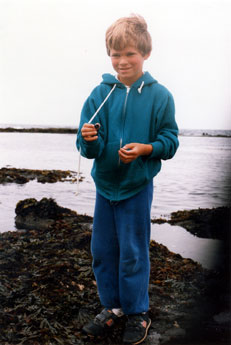People spending less time outdoors
People spending less time outdoors
mongabay.com
February 4, 2008
|
|
People worldwide are spending less time out in nature, according to research published this week in Proceedings of the National Academy of Science (PNAS). The development, warn the authors, could have implications for future conservation policy issues.
Examining trends in visits to national parks in the United States, Japan, Spain, and U.S. state parks as well as the number of hunting, camping, and hiking permits issued annually, Oliver Pergams and Patricia Zaradic report a 18 to 25 percent decline in such activities since the late 1980s. Only day hikes, which represent a small proportion of United States park visits, have increased.
 Fun in the tidepools |
“There’s a real and fundamental shift away from nature — certainly here [in the United States] and possibly in other countries,” said Pergams, a visiting research assistant professor of biological sciences at the University of Illinois at Chicago. “The replacement of vigorous outdoor activities by sedentary, indoor videophilia has far-reaching consequences for physical and mental health, especially in children. Videophilia [i.e. playing video games, surfing the Internet and watching movies and TV] has been shown to be a cause of obesity, lack of socialization, attention disorders and poor academic performance.”
Pergams and Zaradic say less interest in outdoor nature activities could translate to less support for national parks and wildlife conservation.
“We don’t see how this can be good for conservation,” Pergams said. “We don’t see how future generations, with less exploration of nature, will be as interested in conservation as past generations.”
Oliver Pergams and Patricia Zaradic (2008). Evidence for a fundamental and pervasive shift away from nature-based recreation. Proceedings of the National Academy of Sciences, Online Early Edition for the week of February 4-8, 2008
Related
Environmentalism is born with exposure to nature before age 11
A new study out of Cornell University suggests that environmentalism is born in children who are exposed to nature before the age of 11. Nancy Wells, assistant professor of design and environmental analysis in the College of Human Ecology at Cornell, and Kristi Lekies, a research associate in human development at Cornell, analyzed data from a 1998 U.S. Department of Agriculture Forest Service survey that examined childhood nature experiences and adult environmentalism. The researchers sampled more than 2,000 adult Americans, ages 18 to 90, about their early childhood nature experiences and their current adult attitudes and behaviors relating to the environment.
U.S. wildlife refuges generate 4x return on investment
National wildlife refuges generate about $4 in economic activity for every $1 the government spends, according to a study released by the U.S. Fish and Wildlife Service Tuesday.